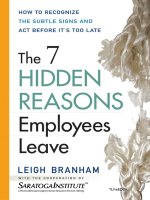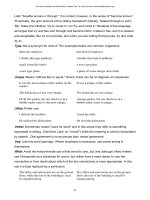Tài liệu THE GOLDEN GOOSE-GRIMM''''S FAIRY TALE doc
Bạn đang xem bản rút gọn của tài liệu. Xem và tải ngay bản đầy đủ của tài liệu tại đây (18.34 KB, 8 trang )
THE GOLDEN GOOSE
There was a man who had three sons, the youngest of whom was
called Dummling,[*] and was despised, mocked, and sneered at on
every occasion.
It happened that the eldest wanted to go into the forest to hew
wood, and before he went his mother gave him a beautiful sweet
cake and a bottle of wine in order that he might not suffer from
hunger or thirst.
When he entered the forest he met a little grey-haired old man who
bade him good day, and said: ‘Do give me a piece of cake out of
your pocket, and let me have a draught of your wine; I am so
hungry and thirsty.’ But the clever son answered: ‘If I give you my
cake and wine, I shall have none for myself; be off with you,’ and
he left the little man standing and went on.
But when he began to hew down a tree, it was not long before he
made a false stroke, and the axe cut him in the arm, so that he had
to go home and have it bound up. And this was the little grey
man’s doing.
After this the second son went into the forest, and his mother gave
him, like the eldest, a cake and a bottle of wine. The little old grey
man met him likewise, and asked him for a piece of cake and a
drink of wine. But the second son, too, said sensibly enough:
‘What I give you will be taken away from myself; be off!’ and he
left the little man standing and went on. His punishment, however,
was not delayed; when he had made a few blows at the tree he
struck himself in the leg, so that he had to be carried home.
Then Dummling said: ‘Father, do let me go and cut wood.’ The
father answered: ‘Your brothers have hurt themselves with it, leave
it alone, you do not understand anything about it.’ But Dummling
begged so long that at last he said: ‘Just go then, you will get wiser
by hurting yourself.’ His mother gave him a cake made with water
and baked in the cinders, and with it a bottle of sour beer.
When he came to the forest the little old grey man met him
likewise, and greeting him, said: ‘Give me a piece of your cake and
a drink out of your bottle; I am so hungry and thirsty.’ Dummling
answered: ‘I have only cinder-cake and sour beer; if that pleases
you, we will sit down and eat.’ So they sat down, and when
Dummling pulled out his cinder-cake, it was a fine sweet cake, and
the sour beer had become good wine. So they ate and drank, and
after that the little man said: ‘Since you have a good heart, and are
willing to divide what you have, I will give you good luck. There
stands an old tree, cut it down, and you will find something at the
roots.’ Then the little man took leave of him.
Dummling went and cut down the tree, and when it fell there was a
goose sitting in the roots with feathers of pure gold. He lifted her
up, and taking her with him, went to an inn where he thought he
would stay the night. Now the host had three daughters, who saw
the goose and were curious to know what such a wonderful bird
might be, and would have liked to have one of its golden feathers.
The eldest thought: ‘I shall soon find an opportunity of pulling out
a feather,’ and as soon as Dummling had gone out she seized the
goose by the wing, but her finger and hand remained sticking fast
to it.
The second came soon afterwards, thinking only of how she might
get a feather for herself, but she had scarcely touched her sister
than she was held fast.
At last the third also came with the like intent, and the others
screamed out: ‘Keep away; for goodness’ sake keep away!’ But
she did not understand why she was to keep away. ‘The others are
there,’ she thought, ‘I may as well be there too,’ and ran to them;
but as soon as she had touched her sister, she remained sticking
fast to her. So they had to spend the night with the goose.
The next morning Dummling took the goose under his arm and set
out, without troubling himself about the three girls who were
hanging on to it. They were obliged to run after him continually,
now left, now right, wherever his legs took him.
In the middle of the fields the parson met them, and when he saw
the procession he said: ‘For shame, you good-for-nothing girls,
why are you running across the fields after this young man? Is that
seemly?’ At the same time he seized the youngest by the hand in
order to pull her away, but as soon as he touched her he likewise
stuck fast, and was himself obliged to run behind.
Before long the sexton came by and saw his master, the parson,
running behind three girls. He was astonished at this and called
out: ‘Hi! your reverence, whither away so quickly? Do not forget
that we have a christening today!’ and running after him he took
him by the sleeve, but was also held fast to it.
Whilst the five were trotting thus one behind the other, two
labourers came with their hoes from the fields; the parson called
out to them and begged that they would set him and the sexton
free. But they had scarcely touched the sexton when they were held
fast, and now there were seven of them running behind Dummling
and the goose.
Soon afterwards he came to a city, where a king ruled who had a
daughter who was so serious that no one could make her laugh. So
he had put forth a decree that whosoever should be able to make
her laugh should marry her. When Dummling heard this, he went
with his goose and all her train before the king’s daughter, and as
soon as she saw the seven people running on and on, one behind
the other, she began to laugh quite loudly, and as if she would
never stop. Thereupon Dummling asked to have her for his wife;
but the king did not like the son-in- law, and made all manner of
excuses and said he must first produce a man who could drink a
cellarful of wine. Dummling thought of the little grey man, who
could certainly help him; so he went into the forest, and in the
same place where he had felled the tree, he saw a man sitting, who
had a very sorrowful face. Dummling asked him what he was
taking to heart so sorely, and he answered: ‘I have such a great
thirst and cannot quench it; cold water I cannot stand, a barrel of
wine I have just emptied, but that to me is like a drop on a hot
stone!’
’There, I can help you,’ said Dummling, ‘just come with me and
you shall be satisfied.’ He led him into the king’s cellar, and the
man bent over the huge barrels, and drank and drank till his loins
hurt, and before the day was out he had emptied all the barrels.
Then Dummling asked once more for his bride, but the king was
vexed that such an ugly fellow, whom everyone called Dummling,
should take away his daughter, and he made a new condition; he
must first find a man who could eat a whole mountain of bread.
Dummling did not think long, but went straight into the forest,
where in the same place there sat a man who was tying up his body
with a strap, and making an awful face, and saying: ‘I have eaten a
whole ovenful of rolls, but what good is that when one has such a
hunger as I? My stomach remains empty, and I must tie myself up
if I am not to die of hunger.’
At this Dummling was glad, and said: ‘Get up and come with me;
you shall eat yourself full.’ He led him to the king’s palace where
all the flour in the whole Kingdom was collected, and from it he
caused a huge mountain of bread to be baked. The man from the
forest stood before it, began to eat, and by the end of one day the
whole mountain had vanished. Then Dummling for the third time
asked for his bride; but the king again sought a way out, and
ordered a ship which could sail on land and on water. ‘As soon as
you come sailing back in it,’ said he, ‘you shall have my daughter
for wife.’
Dummling went straight into the forest, and there sat the little grey
man to whom he had given his cake. When he heard what
Dummling wanted, he said: ‘Since you have given me to eat and to
drink, I will give you the ship; and I do all this because you once
were kind to me.’ Then he gave him the ship which could sail on
land and water, and when the king saw that, he could no longer
prevent him from having his daughter. The wedding was
celebrated, and after the king’s death, Dummling inherited his
kingdom and lived for a long time contentedly with his wife.
[*] Simpleton









